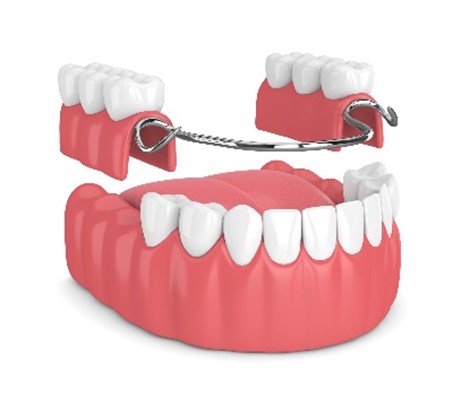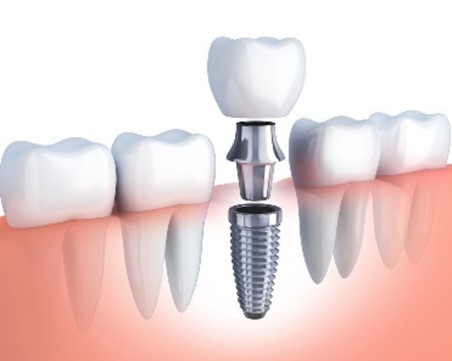What options are there for missing teeth?
When considering replacing a missing tooth, you generally have 4 options that majority of cosmetic dentists will discuss with you:
1. Leave as a gap
2. Denture/Plate/Flipper
3. Bridge/Maryland Bridge/Adhesive bridge
4. Implant(s)
Each option has its advantages and disadvantages, so let’s break down each one.
Leave as a gap
When you lose your tooth, you don’t necessarily need to think about replacing it. If you are happy with the gap, and you can still function as normal regarding eating and cleaning, and it doesn’t give you an aesthetic appearance you’re unhappy with, leaving a space is perfectly acceptable!

Denture/Plate/Flipper
If you are struggling with the appearance of missing teeth, a denture/partial denture/plate is an alternative. A denture is a removable acrylic appliance which has artificial teeth on, that sit in place of your missing ones. The main disadvantage of this is that they can be extremely uncomfortable, loose and make it difficult to chew. However, some patients find that with the right denture and/or adhesive, these problems can be rectified. From a dentist’s point of view, our main disadvantage to our patients is due to the saliva/bacteria that naturally builds up within your mouth, the decay rate can be higher for patients who wear a denture with poor oral hygiene. Dentures also require quite a few adjustments at the beginning of the process, as when loosing a tooth, your bone in that area of the jawbone has no purpose, therefore will start to shrink over time.

Bridge
If a denture is not something you are willing to consider, or have tried but cannot get along with, then a bridge has been a popular approach, and still can be today due to its affordability compared to dental implants. A bridge is essentially teeth that are linked together, including an artificial tooth in place of where yours in missing. The bridge uses your supporting teeth as an anchor to gain stability and positioning. The main advantage to a bridge is that it’s extremely aesthetically pleasing and does not cover any of your gum/palate (like a denture does). However, the main disadvantage is that the supporting teeth you have for the bridge need to be shaved down/cut down/prepared in order to make the space for the bridge to sit on top of.

Dental Implant
A dental implant is a stand-alone metal (usually titanium) screw that sits in your jawbone, acting as a root, and is restored with an implant crown that is placed on top of the implant, also known as the gold standard for replacing missing teeth! The main reason for this is that is does not affect any of your other teeth, neither does it feel uncomfortable, loose or artificial in your mouth, it feels as if it’s your natural tooth. The main hold back for patients wanting to proceed with dental implants is cost. However, as dental implants are now extremely popular within the UK, you have a great deal of high-quality cosmetic dentists in London that offer competitive prices, such as Marylebone Smile Clinic.

FAQs
Which is the best option for a missing tooth?
A dental implant is seen as the ‘gold standard’ for replacing a missing tooth, due to the fact it is standalone (no other teeth are involved) and is our closest replacement for a natural tooth. It also has the longest lifespan of any other replacement option.
What is a Screw-in?
A screw-in, is also know as the implant teeth, fixture or dental implant. These all refer to the same thing.
Will I be put to sleep for implants?
No, this option is entirely down to the patient. For those patients who are extremely nervous, anxious, or have dental phobias, then some implant dentists can provide the option of general anaesthetic. However, there are other options which can be good for nervous patients that want to stay awake, such as sedation. Majority of the time, however, only local anaesthetic is required for the placement of dental implants.
What is a Maryland Bridge?
A Maryland Bridge, also commonly known now as a sticky bridge/adhesive bridge/resin retained bridge is an artificial tooth that sits in place of your missing tooth, with wings attached (sometimes at each side) to the artificial tooth which are glued behind the supporting teeth. The name originates from the University of Maryland Dental School which developed the design several decades ago.
How can I replace my teeth the fastest?
Depending on numerous factors which are independent from patient to patient, a quick fix can or cannot be achieved in all these treatment options. Dentures are usually the fastest way to replace teeth, however for a well-fitting denture, several visits to the dentist are required as there are a few steps needed for the laboratory to create a denture that fits and looks good.
Bridges are also quick in the respect that they generally take two appointments to complete, with a two-three week gap in between. The first appointment is to prepare the teeth for the bridge, and the second to fit the bridge.
Dental implants can sometimes be a quick process, if the patient’s oral health and quality of bone are great, we can sometimes put the teeth on the same day as placing implants. This is not a very common process in the UK, but commonly used abroad. Most commonly, 6-8 weeks is the fastest time an implant can be provided.
What’s the best type of denture if I gag?
A chrome denture is the best type of denture if you gag, as it does not cover the entire surface of your palate and has a very ‘thin-like’ feeling.
How much does a replacement tooth cost?
For dental implants, in the UK, you’ll be looking from £2000-£3000 per tooth, however for cases that require multiple teeth, there are options to keep the cost down with less implants and same amount of teeth, acting as an implant retained bridge/denture.
How do I know if I can have an implant?
Your chosen implant dentist will require a clinical examination of the area, along with X-Rays to confirm if an implant is possible. The patient requires good overall health, no active gum disease (ideally), no signs of infection in any tooth, and an adequate amount of bone. However, for those patients who have one of these listed above, there are additional treatments that can help the successful placement of an implant.
How long does it take to have an implant?
This varies from patient to patient, depending on healing, quality of bone and design of the final teeth. Averagely, the process from start to finish is around two months.
Can implants and bridges become loose as well?
The short answer is, yes. Implants can come loose if they start to fail, and bridges can become loose if they are ill-fitting, cemented with adhesive that is not fit for that purpose, or if the supporting teeth underneath the bridge fail.
What is a bone graft?
A bone graft is the process in which bone is taken from one area and placed into the area where more bone is required. However, as research developed over the last few years, there is substitutional/artificial bone that we can use as opposed to recycling your own.
Can I have multiple implants?
Yes, you can.
What is All on 4?
All on 4/All on 6 is an implant procedure that’s growing rapidly within the UK. If you are missing all your upper teeth, lower teeth, or both, your dentist may be able to place less implants, evenly spaced out in the jawbone, to put the same number of teeth on top that is required for a full arch. This can either be done in the form of a bridge or a denture. For example, with All on 4, the dentist will place 4 implants in the upper jawbone, with 8-10 teeth on top, and the implants act as the anchor. This is a great cost-effective option for those who have lost a lot/all their teeth. It was developed in Portugal by Dr Paulo Malo.
What is the lifespan of a tooth?
There is no definitive lifespan on a tooth, but as to how your oral hygiene presents itself, along with other factors such as gum disease, hereditary and lifestyle choices. If you look after your teeth well and have no active gum disease and/or bone loss, you can be a very lucky position of keeping the tooth for your whole life!
Humans continue to have longer life expectancies with the advent of modern healthcare. This requires our teeth to last longer than they ever have before, highlighting the importance of keeping your own natural teeth for as long as possible.
How can I make my denture stay in place?
If your denture is loose, you can use over the counter denture adhesive to help the denture stay in place, Poly Grip is a very common denture adhesive.
Can I have implants if I have osteoporosis?
The short answer is yes. However, you will need to speak with your implantologist regarding the severity of your osteoporosis and the likelihood of the condition resulting in your dental implants failing and would be too high of a risk.
Can I have implants if I have gum disease?
If you have active gum disease, dental implants should not be placed. However, if you have historical gum disease, then yes implants can be placed. Your oral hygiene will still need to be gold standard and there is always a risk of peri-implantitis should you have a relapse with your gum disease.
What is peri-implantitis?
Peri-implantitis is an inflammatory disease that affects the soft tissue around your dental implant(s). If this is not diagnosed and treated, Peri-implantitis can also move on to affect the hard tissue (alveolar bone) which can result in bone loss, and eventually loss of the dental implant(s).
Are implants from Turkey good?
Yes, some implantologists in Turkey provide good implant treatment to their patients. Our advice would be to do your research on the practice and treating dentist prior to booking in for a consultation and/or treatment. The process in which implants are placed and restored in Turkey can differentiate to the UK, so understanding how they carry out the treatment compared to the UK is paramount. Look out for warning flags such as ‘teeth in a day’! Be aware of the dental tourism that is exceedingly popular in the UK. Our advice is always to have long term dental treatment carried out in the country in which you live.
Want to know more?
Get in touch to enquire about our services or to book an appointment.



